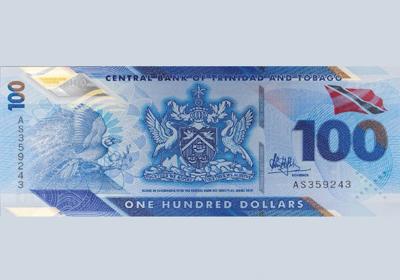ONE of Trinidad and Tobago’s senior banking executives has confirmed that most of the automated teller machines (ATMs) in the local banking system are not currently configured for polymer notes.
That is why the country’s ATMs mostly dispense $20 and $100 notes, said the banker, who requested anonymity because he was not authorised to speak either for his bank or the Bankers Association of T&T on the issue.
The disclosure about the suitability of the existing ATMs to dispense polymer notes casts doubt on how quickly the commercial banks can update the hardware that operates the machines.
The Bankers Association in a news release on Friday said it “fully supports the change and assures members of the public that there will be no disruption to their business and personal transactions during the period of transition”.
The Central Bank of Trinidad and Tobago announced on Thursday afternoon, shortly after the Government’s announcement of the introduction of the new $100 polymer notes, that the new bill becomes legal tender from today.
The Central Bank also said the new $100 polymer note “will co-circulate with the existing paper-based $100 note remaining as legal tender until further notice”.
The bank is due to hold a news conference in Port of Spain this morning to clarify issues surrounding the introduction of the new $100 polymer note.
Questioned on how long it would take the banking system to upgrade its ATM network to make it compatible with polymer notes, the banker did not answer directly, saying ATM technology has advanced in many ways and that the banks would likely be more driven by those advances than by the introduction of polymer notes.
Similar observations were made by another senior banker from a different financial institution who told the Express it will require “infrastructural work” by a bank to get the ATMs ready to dispense polymer notes.
The $50 bill experience
Data on the Central Bank’s website indicates that T&T had 484 ATMs throughout the country as at July 2019.
T&T’s first polymer note, the $50 bill, went into circulation “over the counter” at commercial banks in December 2014.
At the time, the Central Bank announced that the polymer $50 bill would have been available through ATMs on a phased basis across banks from June 2015.
The phased introduction of the $50 bill to T&T’s ATMs appears to have stalled.
Speaking on Friday, the banker also said the bigger issue for local commercial banks was the bulk cash counting machines that all banks use to count millions of dollars daily.
He explained that the bulk cash counting machines are sensitive and are calibrated for T&T’s current paper-based notes.
He noted that to cater for the polymer $100 notes, the foreign vendors of these machines will have to come on site to re-calibrate, which could take months.
During debate in the Senate on Saturday, Opposition Senator Saddam Hosein raised the issue of whether the ATMs at banks would be able to accept the new notes and whether banks would have to adjust their software and hardware to accommodate the new notes.
He said in Aruba, it took the banks six months before their machines were adjusted to accept the notes.
He said former Central Bank governor Jwala Rambarran attempted to replace all T&T bank notes with the polymer notes, and asked why was the $100 note now being replaced.
In a statement last evening, the Central Bank advised that the new polymer $100 notes will be distributed to the commercial banks today and will be available to the public from Tuesday.






